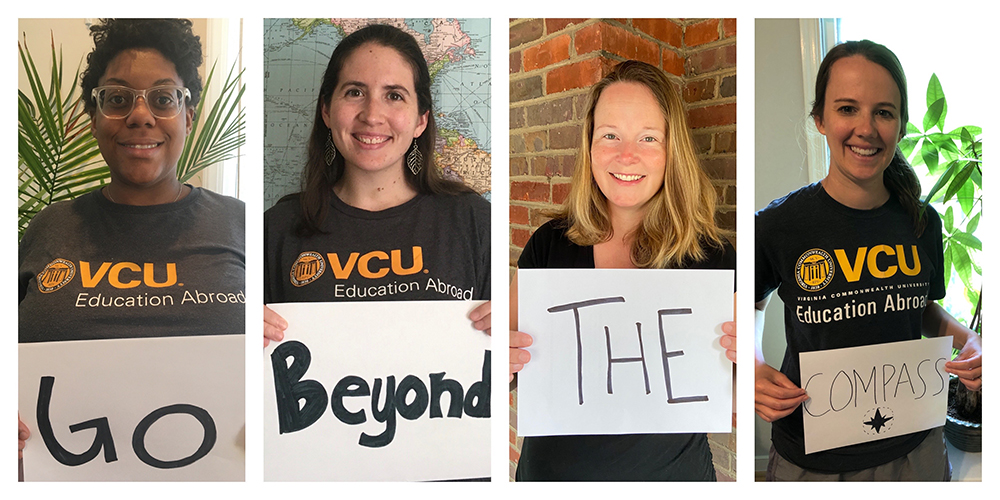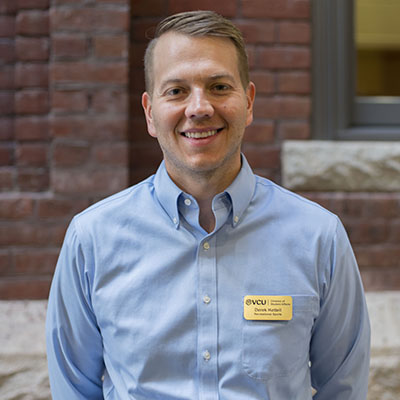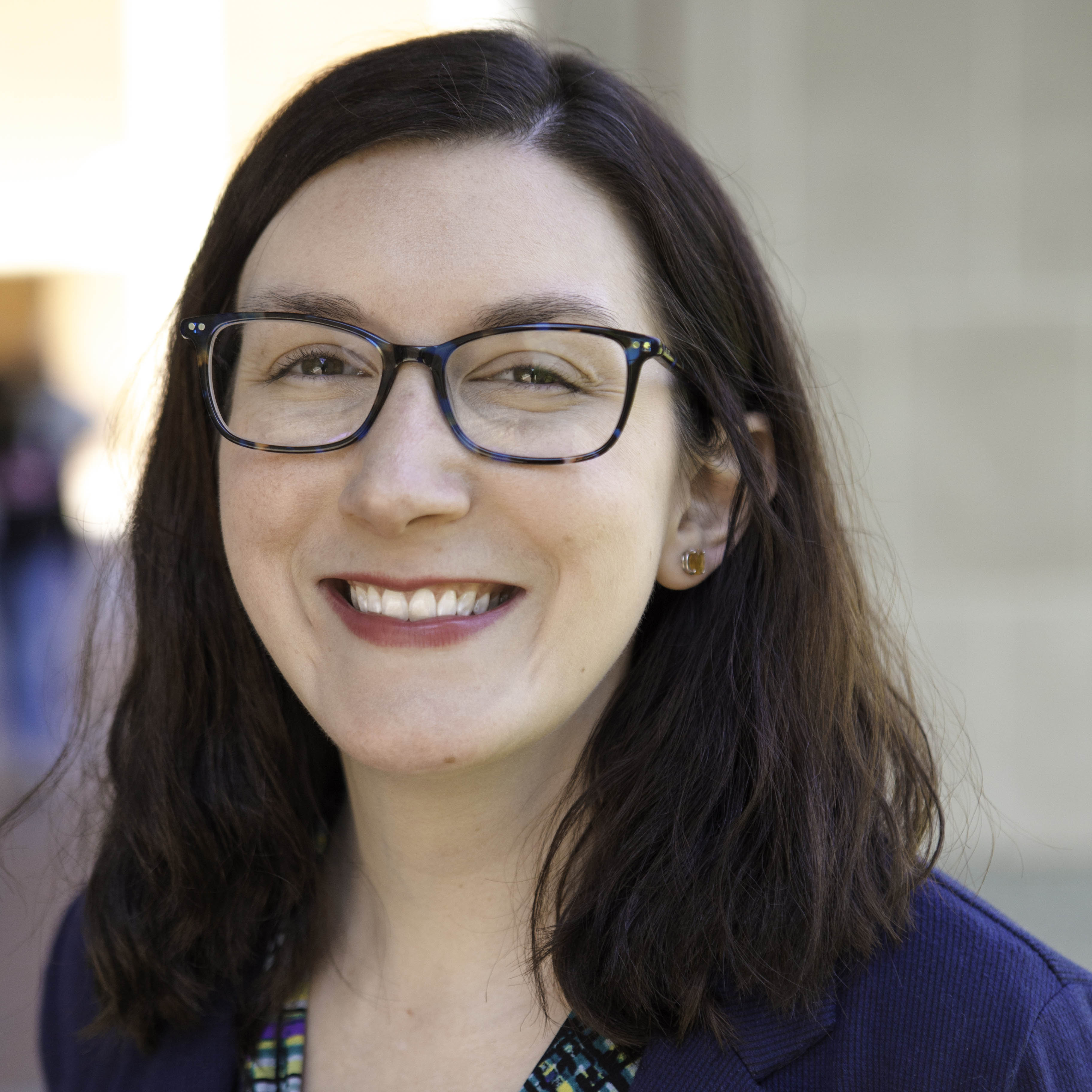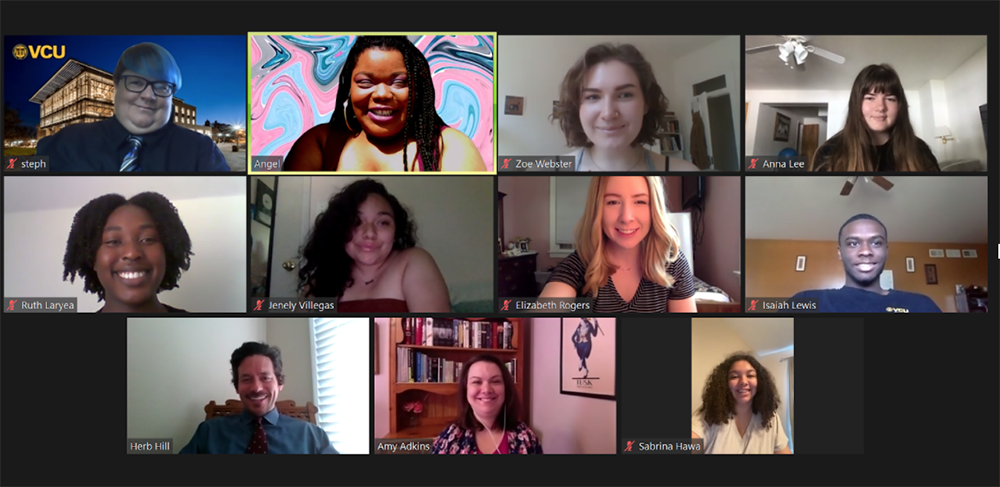Reflections on preparing for fall 2020
As a reflective activity, we asked faculty and staff engaged in experiential learning to answer three questions about how COVID-19 forced them to rethink their approach to their work. These three question were:
- How have the challenges of the last few months helped you rethink the services you provide to VCU students?
- In terms of your area, what's going to look different for students when classes resume in the fall? What changes/preparations does the VCU community need to be aware of?
- Fill us in on some of the hard work you and your teams have been taking on this summer. What are some of the unique challenges you've had to overcome?
Their responses are below - we hope you enjoy reading these testimonies as much as we did!
Education Abroad, Stephanie Tignor

How have the challenges of the last few months helped you rethink the services you provide to VCU students?
COVID-19 has brought to light many opportunities for Education Abroad to improve its services to VCU students. Our experiences earlier this year in recalling spring study abroad students and cancelling programs that were set to run in summer and fall helped us to see areas of improvement for our processes and procedures including, most notably, matters concerning health, safety, insurance, and crisis management. We are now reassessing many aspects of Education Abroad from our program options/partners to policies including those pertaining to booking and registering student international travel and assisting and communicating with students in times of crisis. Although study abroad is on hold until U.S. Department of State and Centers for Disease Control and Prevention travel warning levels lessen and until host nations are willing to accept U.S. travelers, new opportunities for students to engage globally have arisen during this time such as virtual global internships and programs, and opportunities for domestic students to engage with VCU's international student population on campus are even more important than ever. Lastly, our office's remote work status has forced us to rethink student outreach including discussion of innovative tools such as videos, apps, and virtual study abroad fairs to encourage students to start or continue planning to study abroad in the future. We hope students will be more eager than ever to pursue education abroad after spending such an extended period of time living in such a limited bubble and that the reasons to study abroad are even more apparent.
In terms of your area, what's going to look different for students when classes resume in the fall? What changes/preparations does the VCU community need to be aware of?
VCU's Education Abroad team is all working remotely this fall, but that doesn't mean that we aren't available to students; on the contrary, we have even more opportunities for students to learn about their study abroad options and to begin planning when, where, and how they will study abroad. In addition to one-on-one advising services, we will be making available a set of resources for faculty/staff, including video content, to share with students this fall and we are also available for virtual presentations, discussions, etc. In the meantime, we encourage students, families, faculty and staff to visit a new section on our website that was developed in response to COVID-19 titled "Keep on Studying Abroad." We are teaching two online sections of a reimagined UNIV 191: Maximizing Your Study Abroad for first year students. We are also collaborating with colleagues across the country on a Virtual Lessons From Abroad conference for returnees which will be held in October 2020. At this time, all fall study abroad programs have been cancelled, and we expect to have an official announcement regarding the status of winter break programs within the next month. The status of spring semester and spring break study abroad programs will be decided by the end of September.
Fill us in on some of the hard work you and your teams have been taking on this summer. What are some of the unique challenges you've had to overcome?
Despite program cancellations for summer and fall, our team has continued advising students who hope to study abroad in future terms. This summer we are making revisions to processes, procedures, and policies in Education Abroad and working on developing new virtual tools for advising and outreach as well going virtual with returnee resources and programming like pre-departure orientation. We are revising the timeline and process for faculty-led programs proposals, beginning the process of adopting a new insurance program for our student participants, and creating a new tool on our website to guide students who wish to utilize veterans benefits for study abroad. We are also creating reports on study abroad participation to provide useful data sets for academic units and other audiences. In addition, along with the rest of GEO, Education Abroad is planning ways in which we will intentionally adopt a more inclusive approach to our work with students, faculty, and staff within our unit and across the university.
Recreational Sports, Derek Hottell

How have the challenges of the last few months helped you rethink the services you provide to VCU students?
Honestly, I think this experience has somewhat highlighted the value of brick and mortar education. I think some of the shifts we have made to leverage technology to expand our offerings and meet the community where they are (e.g., virtual fitness, online training, esports, virtual resilience lab appointments, virtual escape rooms, etc.) will continue in perpetuity because they allow activities to be easily scaled and meet previously unmet needs. But, I also think that you have seen the power of in-person interactions. Education is both a science and an art or as scholars like Astin or Kuh discuss, you cannot necessarily measure our production the same way you measure a factory's production that produces widgets. It is not a uniform input and uniform output. If we are being honest, we cannot entirely and precisely isolate how and why a student learns, but what seems to be even clearer as a result of this pandemic is the power of the peer environment. Online learning just doesn't seem to replicate that the same way, and students are missing that.
In terms of your area, what's going to look different for students when classes resume in the fall? What changes/preparations does the VCU community need to be aware of?
Our area is going to look very different! We will be using reservation blocks to limit the population density in the facility. We have spaced out equipment to ensure the required ten feet of physical distancing can be maintained. We will be limited in what sports activities we can offer, and we will not be able to transport students for outdoor trips using vans, so we will be doing a lot of park and play options. I am intrigued to see how students use the facility and programs because campus recreation centers are not simply on-campus exercise facilities, and students do not necessarily just use them to exercise. They use them to make new friends, meet existing friends, try new things, and generally relieve stress and have fun. The model we have established for the pandemic is necessary, but it has real sacrifices. It will not facilitate fun and joy for students as much as it will facilitate health and exercise.
Fill us in on some of the hard work you and your teams have been taking on this summer. What are some of the unique challenges you've had to overcome?
We learn through play, and we use sports to teach students and foster a sense of community. Most of the tools we use (e.g., basketball, soccer, rafting, clubs, cycling, lifting, teambuilding, challenge course, and so on) require students to literally bump up against one another, to make physical contact or at the very least be in close proximity to one another. None of those things are currently advisable, so the staff have been working to ensure activities that meet physical distancing requirements can still be provided (e.g., swimming, tennis, badminton, cornhole, esports, etc.), but one of our strengths has always been offering such a wide array of activities that a student can find something they want to pursue. So, what does basketball look like? We cannot play a game, but maybe we can play HORSE or hotshot? It may seem trivial, but folks need a competitive outlet. They need the ability to be off-campus and commune with nature. We are going to provide those experiences, but it will look different.
Career Services, Samara Reynolds

How have the challenges of the last few months helped you rethink the services you provide to VCU students?
- In March 2020, the VCU Career Services team quickly pivoted to be able to offer programs and services fully online, including virtual appointments and mock interviews, workshops and classroom presentations via Zoom, and even our first virtual career fair (Teacher Recruitment Day) via a tool called Brazen with the support of the VCU Alumni office. Campus closure presented an opportunity for our team to learn and try new things in the virtual space that we may have had light experience with or wanted to test out someday, that we now had extra incentive to pilot and iterate upon.
- We have confirmed over the past few months that online appointments, presentations, and career fairs can offer additional flexibility and accessibility for many students and alumni who need our services but may not have been able to easily come to campus during work hours to meet in person. There are technologies like Loom (screen capture tool) that make daily services like virtual resume reviews even easier than methods we have been used to.
- Our staff has been able to stay connected to each other throughout the spring and summer, showing the value of clear and consistent communication, whether on campus or miles apart. We have also engaged in a great deal of professional development and skill-building, learning from national and regional best practices, as well as getting new ideas for how to better engage employers, serve students, and more.
- We have reached out to alumni and employers and they have come through to support VCU with new job and internship opportunities, as well as a willingness to network and consult.
- Overall, the last few months have shown us that VCU Career Services can serve students and alumni extremely effectively remotely, and we look forward to continuing to do so as we move into Fall 2020.
In terms of your area, what's going to look different for students when classes resume in the fall? What changes/preparations does the VCU community need to be aware of?
- We will be offering all advising appointments, presentations and workshops, career fairs, and other events online via Zoom, Handshake, and other virtual platforms during Fall 2020.
- We will have open office hours in the Student Commons each morning, Monday-Thursday starting on August 10th. During those hours, VCU Career Services team members will be available for student phone calls, emails, and socially distant opportunities for quick questions related to career development and our programs and services. Monday-Thursday afternoon and all day Fridays, we will be available virtually via email, phone, Zoom appointments, and through our website and Handshake.
- We are shifting our Suit Yourself Closet in the Student Commons to a by-appointment-only format, open two mornings a week, so we can implement safe and effective cleaning practices. We are also planning to open a Suit Yourself Closet on the MCV campus in Hunton Student Center, ideally in Spring 2021.
- While we will not be able to offer LinkedIn/professional headshot photography in our office this fall due to social distancing restrictions, we are in the process of creating and distributing a guide for how students and alumni can take professional photos for use in networking and applications from the safety of their home or another neutral space.
- Members of our team are teaching a number of career-related courses this fall, offered via online, in-person, and hybrid formats. Undergraduates can participate in one of our UNIV 191 sections and graduate students can enroll in GRAD 610, if interested.
- Check out our updated website and Handshake for additional details and availability.
Fill us in on some of the hard work you and your teams have been taking on this summer. What are some of the unique challenges you've had to overcome?
- This summer the VCU Career Services team has been busy with virtual appointments, employer outreach, helping revamp procedures and hosting trainings related to the Federal Work-Study program, collecting post-graduation outcomes data, and working on strategic planning projects related to internship funding, campus partner collaborations, improving and expanding services through technology, updating our website, data analysis, and much more.
- We also onboarded three new team members while completely remote. William Burke, Brian Cone, and Sonya Barnes moved from the Pre-Professional Health Advising office in Student Success to become part of the Career Services staff this summer. William and Brian now serve as Career Advisors for Pre-Professional Health & STEM, and Sonya is our new Assistant Director for Health Sciences Career Advising, focused on serving the MCV campus.
- Our team has also used the past few weeks and months to design and deliver 20 customized online workshops for new and continuing students as part of a new Student Success Summer Workshop Series. We have spent time evaluating options for virtual career fairs this fall, found new tools and techniques to enhance online appointments, presentations, and teaching, while also brainstorming and implementing practices for more visibly and tangibly supporting underrepresented students, colleagues, and employers. We have thoroughly reviewed and updated resources on our website for 24/7 access. Additionally, we have been navigating strategies to make online advising, workshops, marketing materials, and events even more accessible through universal design best practices like captioned recordings, alt text, and providing information in multiple formats.
- The challenges of this spring and summer have also given us a new and more strategic focus on marketing and communications efforts and helped us cultivate remote work and experiential learning opportunities for students to take advantage of from any geographic location.
Undergraduate Research, Herb Hill

How have the challenges of the last few months helped you rethink the services you provide to VCU students?
For our students and faculty stakeholders, the importance of clear communication is key. But it is just as important to convey accurate information even if that means being patient while inquiries and concerns are coming in at high volume. Coordinating new policies and addressing systemic challenges across multiple units takes time. Some individual cases required immediate attention but, in general, our first engagement with stakeholders was simply one of cataloguing and communicating concerns as new policies and protocols were under discussion so that institutional decisions were made based on the full scope of our diverse community's concerns. In this way, we were able to address those concerns in systematic ways that made sense across multiple units. To be concise, this experience revealed how truly interconnected we are as a university.
Like many of us, the ability to move quickly to online avenues for advising and engagement was critical. For research specifically, a move to virtual research dissemination, student advising, and pre-experience preparation was a relatively easy lift. However, due to the pandemic, a number of training programs wouldn't be able to continue over the summer. Those that were able to make the transition essentially moved a hands-on experience to an online environment. This meant approaching the learning experience of undergraduate research with an even greater emphasis on flexibility, and student/faculty well-being. Mentoring and undergraduate research are already challenging experiences. Engaging with them during a global pandemic obviously creates additional challenges. Approaching cohort experiences with mindfulness, creating space and time for listening sessions, facilitating discussions around persistence and self-care, and being flexible with students' and mentors' real life challenges were essential in creating an environment where productive experiential learning could happen.
In terms of your area, what's going to look different for students when classes resume in the fall? What changes/preparations does the VCU community need to be aware of?
Much of our advising, workshops, and informational sessions will move online. Students will still have direct face-to-face access with our office when they need it, but we will encourage virtual meetings and sessions. The Return to Research Plan indicates an 85% return to research operations by July 31st. And research that can be done remotely has surged over the summer, with a significant number of faculty seeking student research assistants. In the fall, students will be allowed to return to labs where appropriate safety and distancing can be observed, but we do expect a decrease in lab-based research experiences due to distancing guidelines and faculty concern for student health. We plan to increase students' access to campus research opportunities by centralizing campus-wide posting of available positions using the Student Opportunity Center platform, which will streamline the recruitment process for faculty mentors and the application process for aspiring student researchers.
Fill us in on some of the hard work you and your teams have been taking on this summer. What are some of the unique challenges you've had to overcome?
Moving on-campus summer research programs to a virtual environment (where possible) was a significant challenge, but something that our program directors did very well. VCU was even able to onboard a new research training program during this time. Programs that were able to continue include the VCU Fellowships for Undergraduate Research (UROP, iCubed, CCTR, CENR), the VCU GREAT Program, the Mathematics Research Experience for Undergraduates, Camp Qmunity Summer Intensive, the Honors Summer Undergraduate Research Program. While we wish to celebrate the continuation of these programs during COVID, there are a number of VCU research training programs that weren't able to continue due to the ramifications of the pandemic. All of the stakeholders involved in those programs wanted nothing more than to see their students engage with a high-level, mentored research experience so we want to make sure that their hard work is acknowledged.
The move to remote learning in spring also created a number of challenges for our Work Study Research Assistant program, which engages students of financial need in paid research experiences. While we wanted students to have the opportunity to continue their research, we also acknowledged the fact that circumstances related to the pandemic may prevent many of them from doing so. Of utmost priority was the students' ability to continue accessing their work study funds. In coordination with university leadership, we were able to ensure that students had the option to continue in their research positions while "earning" work study funds at an overtime rate during a summer extension. Furthermore, those students who were not able to continue in their research positions were still able to receive their work study funding.
The resilience and persistence of our faculty and students during this time has been incredible, and the importance of ensuring proper support for those in need is at the forefront of my mind as we enter into an uncertain fall semester.
Mr. Anirban Mahanty, one of our Work Study Research Assistants (also a VCU LEAD member, Honors College student, and Biology major!) was recently accepted to the NIH Undergraduate Scholarship Program. The picture above is also a Zoom group picture of our VCU GREAT cohort, shortly before completing our first remote summer program!